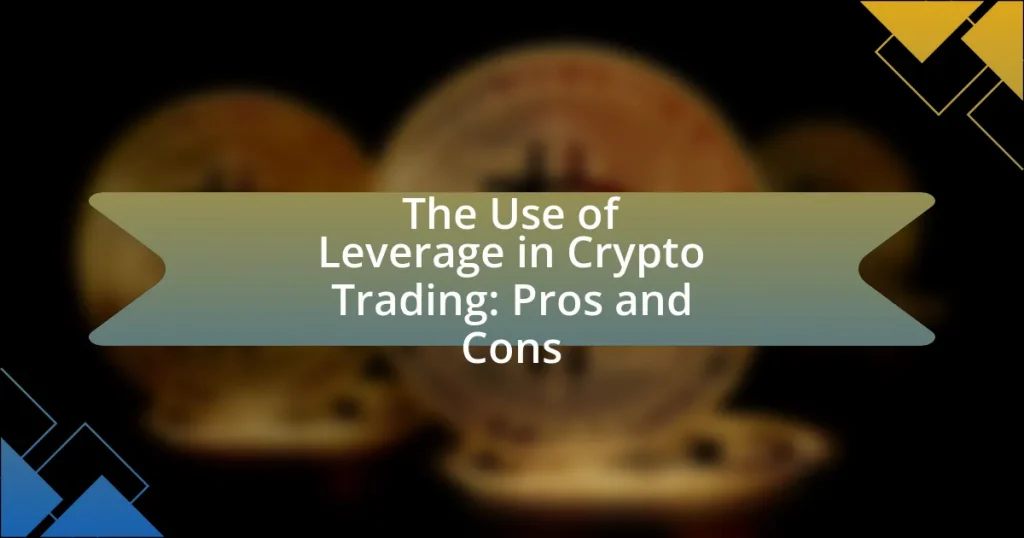Whistleblower protections in the context of crypto regulation are essential legal safeguards that encourage individuals to report misconduct within the cryptocurrency sector without fear of retaliation. These protections are vital for exposing fraud and unethical practices, thereby promoting transparency and accountability in a rapidly evolving market. The article explores the importance of these protections, the risks faced by whistleblowers, and the legal frameworks that support them, including the Dodd-Frank Act and the Whistleblower Protection Act. It also examines the challenges in implementing these protections, the role of whistleblowers in regulatory enforcement, and future trends that may enhance whistleblower rights in the crypto industry.

What are Whistleblower Protections in the Context of Crypto Regulation?
Whistleblower protections in the context of crypto regulation refer to legal safeguards that encourage individuals to report misconduct or illegal activities within the cryptocurrency sector without fear of retaliation. These protections are crucial as they help expose fraud, market manipulation, and other unethical practices that can undermine the integrity of financial systems. For instance, the Dodd-Frank Wall Street Reform and Consumer Protection Act in the United States provides financial incentives and protections for whistleblowers who report violations of securities laws, which can extend to crypto-related activities. Such regulations aim to foster transparency and accountability in the rapidly evolving crypto market, ensuring that whistleblowers can safely disclose information that may be vital for regulatory enforcement and consumer protection.
Why are Whistleblower Protections Important in the Crypto Industry?
Whistleblower protections are important in the crypto industry because they encourage individuals to report illegal activities without fear of retaliation. In an industry characterized by rapid innovation and regulatory uncertainty, these protections help uncover fraud, money laundering, and other illicit practices that can undermine market integrity. For instance, the U.S. Securities and Exchange Commission (SEC) has reported that whistleblower tips have led to significant enforcement actions, highlighting the effectiveness of such protections in promoting transparency and accountability. By safeguarding whistleblowers, the crypto industry can foster a culture of compliance and ethical behavior, ultimately contributing to a more stable and trustworthy financial ecosystem.
What risks do whistleblowers face when reporting in the crypto sector?
Whistleblowers in the crypto sector face significant risks, including retaliation, legal repercussions, and reputational damage. Retaliation can manifest as job loss, harassment, or threats from employers or peers, as seen in cases where individuals exposed fraudulent activities within crypto firms. Legal repercussions may arise from breaches of confidentiality agreements or regulatory violations, which can lead to lawsuits or criminal charges. Additionally, whistleblowers risk their reputations, as public disclosure of their identities can lead to social ostracism or loss of professional credibility, particularly in an industry where anonymity is often valued. These risks highlight the need for robust whistleblower protections to encourage reporting of misconduct in the crypto sector.
How do whistleblower protections encourage reporting of misconduct?
Whistleblower protections encourage reporting of misconduct by providing legal safeguards that shield individuals from retaliation. These protections create a safer environment for whistleblowers, ensuring that they can report unethical or illegal activities without fear of losing their jobs or facing harassment. For instance, the Whistleblower Protection Act in the United States offers remedies for employees who experience retaliation, which has led to an increase in reported cases of fraud and misconduct. According to a 2020 report by the U.S. Securities and Exchange Commission, whistleblower tips have significantly contributed to the recovery of billions in investor funds, demonstrating the effectiveness of these protections in promoting accountability and transparency.
What Legal Frameworks Support Whistleblower Protections in Crypto?
Legal frameworks that support whistleblower protections in crypto include the Dodd-Frank Wall Street Reform and Consumer Protection Act and the Whistleblower Protection Act. The Dodd-Frank Act provides financial incentives and protections for whistleblowers who report securities law violations, which can extend to fraudulent activities in the cryptocurrency sector. The Whistleblower Protection Act safeguards federal employees who disclose information about illegal or unethical activities, including those related to cryptocurrency operations. These laws are designed to encourage reporting by offering anonymity and protection from retaliation, thereby fostering transparency and accountability in the rapidly evolving crypto landscape.
What are the key laws governing whistleblower protections in the United States?
The key laws governing whistleblower protections in the United States include the Whistleblower Protection Act of 1989, the Sarbanes-Oxley Act of 2002, and the Dodd-Frank Wall Street Reform and Consumer Protection Act of 2010. The Whistleblower Protection Act provides federal employees with protection against retaliation for reporting misconduct, while the Sarbanes-Oxley Act extends protections to employees of publicly traded companies who report fraudulent activities. The Dodd-Frank Act enhances these protections by offering monetary rewards for whistleblowers who provide information leading to successful enforcement actions. These laws collectively establish a framework that encourages reporting of wrongdoing while safeguarding whistleblowers from adverse consequences.
How do international regulations compare in terms of whistleblower protections?
International regulations on whistleblower protections vary significantly, with some countries offering robust safeguards while others provide minimal or no protections. For instance, the European Union’s Whistleblower Protection Directive mandates member states to implement comprehensive protections for whistleblowers, including confidentiality and protection against retaliation. In contrast, the United States has a patchwork of laws, such as the Whistleblower Protection Act, which offers protections primarily for federal employees, leaving gaps for those in the private sector. Additionally, countries like Australia have recently strengthened their whistleblower laws, providing broader protections and incentives for reporting misconduct. These differences highlight the varying levels of commitment to safeguarding whistleblowers across jurisdictions, impacting the effectiveness of reporting mechanisms in sectors like cryptocurrency regulation.
How Do Whistleblower Protections Impact Crypto Regulation Enforcement?
Whistleblower protections significantly enhance crypto regulation enforcement by encouraging individuals to report misconduct without fear of retaliation. These protections create a safer environment for whistleblowers, leading to increased reporting of fraudulent activities, which is crucial in the rapidly evolving and often opaque cryptocurrency market. For instance, the U.S. Securities and Exchange Commission (SEC) has reported that whistleblower tips have led to numerous investigations and enforcement actions, underscoring the effectiveness of these protections in identifying and addressing violations in the crypto space.
What role do whistleblowers play in identifying regulatory violations?
Whistleblowers play a crucial role in identifying regulatory violations by exposing misconduct that may otherwise remain hidden. They provide firsthand accounts of illegal activities, such as fraud or non-compliance with regulations, which can prompt investigations by regulatory bodies. For instance, the U.S. Securities and Exchange Commission (SEC) has reported that whistleblower tips have led to significant enforcement actions, recovering billions in penalties. This demonstrates that whistleblowers are essential in maintaining regulatory integrity and accountability within industries, including the cryptocurrency sector, where transparency is vital for investor protection and market stability.
How can whistleblower reports influence regulatory actions and policies?
Whistleblower reports can significantly influence regulatory actions and policies by providing critical information that exposes misconduct or regulatory violations within organizations. These reports often lead to investigations by regulatory bodies, prompting changes in policies to enhance compliance and accountability. For instance, the U.S. Securities and Exchange Commission (SEC) has awarded millions in whistleblower rewards, which incentivizes individuals to report securities law violations, thereby shaping regulatory frameworks and enforcement strategies. The impact of such reports is evident in cases like the 2008 financial crisis, where whistleblower disclosures led to increased scrutiny and reforms in financial regulations.
What Challenges Exist in Implementing Whistleblower Protections in Crypto?
Implementing whistleblower protections in crypto faces significant challenges, primarily due to the decentralized nature of cryptocurrencies and the lack of regulatory frameworks. The anonymity that blockchain technology provides can deter whistleblowers from coming forward, as they may fear retaliation without adequate legal safeguards. Additionally, the absence of standardized regulations across jurisdictions complicates the enforcement of protections, leaving whistleblowers vulnerable to legal repercussions. A report by the International Monetary Fund highlights that the rapid evolution of the crypto market outpaces regulatory responses, further exacerbating the risks for potential whistleblowers.
What are the common barriers to effective whistleblower protections?
Common barriers to effective whistleblower protections include fear of retaliation, lack of anonymity, insufficient legal frameworks, and organizational culture that discourages reporting. Fear of retaliation often prevents individuals from coming forward, as they worry about job loss or harassment. Lack of anonymity can expose whistleblowers to further risks, making them vulnerable to backlash. Insufficient legal frameworks, such as weak laws or inadequate enforcement mechanisms, fail to provide adequate support for whistleblowers. Additionally, an organizational culture that prioritizes loyalty over transparency can create an environment where reporting misconduct is discouraged, further hindering effective whistleblower protections.
How can the crypto industry address these challenges?
The crypto industry can address challenges by implementing robust whistleblower protection mechanisms that encourage reporting of misconduct without fear of retaliation. Establishing clear legal frameworks that safeguard whistleblowers can enhance transparency and accountability within the industry. For instance, jurisdictions like the United States have laws such as the Dodd-Frank Act, which incentivizes whistleblowers by offering financial rewards and protection against employer retaliation. This legal backing has proven effective in various sectors, leading to increased reporting of fraud and misconduct, thereby fostering a culture of compliance and ethical behavior in the crypto space.
How Can Stakeholders Enhance Whistleblower Protections in Crypto?
Stakeholders can enhance whistleblower protections in crypto by implementing robust legal frameworks and establishing clear reporting mechanisms. Legal frameworks should include anti-retaliation laws that protect whistleblowers from job loss or harassment, similar to those in traditional finance, which have been shown to encourage reporting of misconduct. Additionally, stakeholders can create anonymous reporting channels that ensure confidentiality, thereby reducing the fear of exposure. Research indicates that organizations with strong whistleblower protections see a higher rate of reporting unethical behavior, which is crucial in the rapidly evolving crypto landscape where regulatory oversight is still developing.
What best practices can organizations adopt to protect whistleblowers?
Organizations can adopt several best practices to protect whistleblowers, including implementing clear reporting procedures, ensuring confidentiality, and providing anti-retaliation policies. Clear reporting procedures allow whistleblowers to report misconduct without fear, while confidentiality safeguards their identity, which is crucial for their protection. Anti-retaliation policies must be enforced to prevent any negative consequences for whistleblowers, as studies show that fear of retaliation is a significant barrier to reporting wrongdoing. For instance, the U.S. Securities and Exchange Commission (SEC) has established a whistleblower program that includes financial incentives and legal protections, demonstrating the effectiveness of such measures in encouraging reporting.
How can regulatory bodies improve their support for whistleblowers?
Regulatory bodies can improve their support for whistleblowers by implementing stronger legal protections and providing clear reporting mechanisms. Enhanced legal frameworks, such as the Whistleblower Protection Act, can safeguard whistleblowers from retaliation, ensuring they feel secure in reporting misconduct. Additionally, regulatory bodies should establish anonymous reporting channels, which have been shown to increase the likelihood of whistleblower participation, as evidenced by studies indicating that anonymity reduces fear of repercussions. Training programs for employees on the importance of whistleblowing and the protections available can further encourage reporting. By adopting these measures, regulatory bodies can create a more supportive environment for whistleblowers, ultimately fostering greater accountability within the crypto sector.
What Future Trends Can We Expect for Whistleblower Protections in Crypto Regulation?
Future trends for whistleblower protections in crypto regulation will likely include enhanced legal frameworks, increased anonymity measures, and stronger enforcement mechanisms. As regulatory bodies recognize the importance of whistleblowers in combating fraud and misconduct in the rapidly evolving crypto space, they are expected to implement more robust protections similar to those in traditional finance. For instance, the U.S. Securities and Exchange Commission has already begun to adapt its whistleblower program to encompass crypto-related violations, indicating a shift towards more comprehensive protections. Additionally, jurisdictions may adopt international standards, such as those proposed by the Financial Action Task Force, to ensure whistleblower safety and incentivize reporting. These trends reflect a growing acknowledgment of the critical role whistleblowers play in maintaining market integrity and consumer trust in the cryptocurrency sector.
How might evolving technologies impact whistleblower protections?
Evolving technologies may enhance whistleblower protections by enabling secure and anonymous reporting channels. For instance, blockchain technology can provide immutable records of whistleblower submissions, ensuring that reports cannot be altered or deleted, thus safeguarding the integrity of the information. Additionally, advancements in encryption can protect the identities of whistleblowers, reducing the risk of retaliation. A study by the National Whistleblower Center highlights that secure communication tools can increase the likelihood of individuals coming forward with information about wrongdoing, as they feel safer in disclosing sensitive information.
What role will public awareness play in shaping future protections?
Public awareness will play a crucial role in shaping future protections by fostering a culture of transparency and accountability in the crypto industry. Increased public knowledge about the importance of whistleblower protections can lead to greater advocacy for regulatory reforms, as seen in other sectors where public pressure has resulted in stronger protections, such as the financial services industry post-2008 crisis. Research indicates that informed citizens are more likely to support policies that protect whistleblowers, which can ultimately lead to enhanced regulatory frameworks that safeguard both whistleblowers and the integrity of the crypto market.
What Practical Steps Can Individuals Take to Safeguard Whistleblower Rights in Crypto?
Individuals can safeguard whistleblower rights in crypto by understanding and utilizing existing legal protections, such as the Whistleblower Protection Act, which offers confidentiality and protection against retaliation. They should document all relevant information meticulously, including communications and evidence of wrongdoing, to support their claims. Additionally, individuals can seek legal counsel specializing in whistleblower cases to navigate the complexities of reporting misconduct in the crypto sector. Engaging with established whistleblower organizations can also provide resources and support, enhancing the safety and effectiveness of their disclosures. These steps are crucial as they help ensure that whistleblowers are protected and their rights upheld in a rapidly evolving regulatory landscape.















